Highlighting the multifaceted leadership of Joshua, this exploration delves into biblical narratives that reveal lessons in courage, faith, and legacy.

Images of Joshua in the Bible
In the vast tapestry of biblical narratives, Joshua stands out like a beacon of leadership and faith amidst the tumultuous journey of the Israelites. You've likely heard of his military exploits and unwavering trust in God, but there's a depth to his character that often goes unnoticed.
From being Moses' successor to leading the charge at Jericho, Joshua's life was filled with moments that define what it means to be a leader under divine command. Yet, beneath these well-known stories lies a complexity that begs a closer look, inviting you to explore the nuanced images of Joshua that resonate with themes of courage, faith, and legacy.
Why did these moments shape him, and how do they influence our understanding of leadership and faithfulness today?
Key Takeaways
- Joshua's leadership blends traditional faith with innovative military strategies, showcasing adaptability in biblical narratives.
- His role in the spy mission and Jericho's fall underline his tactical acumen and reliance on divine guidance.
- Rahab's interaction with Joshua's spies illustrates his willingness to incorporate outsiders based on faith and contributions to the Israelite cause.
- Joshua's farewell emphasizes a legacy of unity, strategic foresight, and unwavering commitment to God's covenant.
Joshua: Moses' Successor

Assuming the mantle of leadership from Moses, Joshua emerges as a pivotal figure in the transition of Israelite leadership, demonstrating both continuity and innovation in his approach. This leadership transition marks a critical juncture in the Biblical narrative, where Joshua's role signifies not only a change in leadership but also a reaffirmation of the covenant between God and Israel. His actions, particularly those surrounding covenant renewal, underscore the importance of maintaining a direct link to the foundational events and promises that defined the nation's identity.
You'll notice that Joshua's approach to leadership, while rooted in the traditions established by Moses, also incorporates significant modifications to address the new challenges facing the Israelites. Through covenant renewal ceremonies, he reinforces the community's commitment to the laws and commandments given to Moses, ensuring continuity in religious practice and belief. At the same time, his innovative strategies for conquering and settling in Canaan reflect a pragmatic adaptation to the realities of their new environment. Thus, Joshua's leadership exemplifies a balanced synthesis of adherence to tradition and adaptability, crucial for guiding the Israelites through a period of profound transformation.
The Spy Mission at Jericho
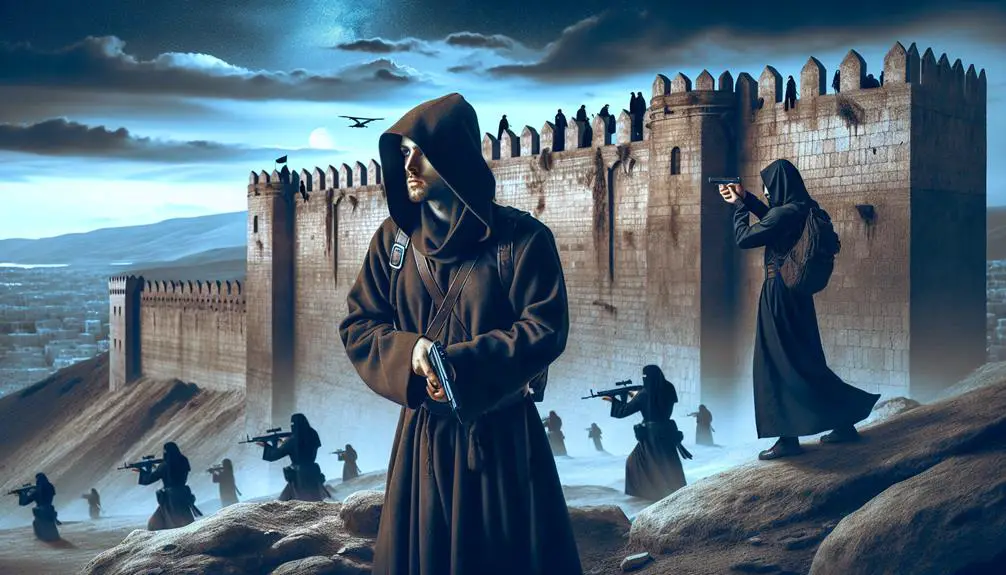
You'll find the spy mission at Jericho pivotal in understanding Joshua's military tactics and leadership.
This operation highlights the strategic reconnaissance of Jericho, underscored by Rahab's critical assistance, without which success might've been elusive.
Moreover, the narrative's climax with the wall's miraculous collapse offers insight into the interplay between divine intervention and human strategy in biblical warfare accounts.
Jericho's Reconnaissance Strategy
Joshua's reconnaissance strategy for the city of Jericho involved sending two spies to gather intelligence on the city's defenses and morale. This mission was crucial for understanding the strength and readiness of their adversary, employing stealth tactics and enemy surveillance to ensure success. The approach highlights several key aspects:
- *Stealth tactics* were essential for infiltration without detection.
- *Enemy surveillance* allowed for a detailed assessment of Jericho's defenses.
- The spies assessed the city's *military readiness* and fortifications.
- Gathering intel on the *morale of Jericho's inhabitants* provided psychological insights.
- The mission aimed to identify *potential weaknesses* in the city's defenses.
This strategy underscores the importance of thorough preparation and intelligence in overcoming formidable challenges.
Rahab's Critical Assistance
Building on the reconnaissance strategy for Jericho, Rahab's critical assistance to the spies became a pivotal moment in the mission's success. As a figure intricately woven into the narrative fabric of this historical conquest, Rahab's actions underscore her significance beyond mere assistance.
Her lineage, eventually intertwining with the genealogy of significant biblical figures, emphasizes the transformative power of faith and redemption. Moreover, the scarlet symbol, a piece of red cord she was instructed to hang from her window, not only served as a signal for her and her family's safety but also as a profound emblem of protection and covenant.
This symbol, deeply embedded in the narrative, highlights the complexity of Rahab's role, bridging the gap between her past and her pivotal contribution to the Israelites' strategic victory at Jericho.
Wall's Miraculous Collapse
How did the walls of Jericho, a formidable barrier to the Israelites' conquest, collapse in such a miraculous manner, marking a pivotal moment in their mission? Scholars have long debated this event, analyzing it through various lenses including archaeological evidence and urban development.
To understand this phenomenon, consider:
- Archaeological evidence suggests advanced urban development in Jericho, indicating a well-fortified city.
- The walls' structure, possibly weakened over time, mightn't have withstood certain natural phenomena.
- Religious texts describe the collapse as divine intervention, a key aspect of the narrative.
- The event symbolizes the power of faith and determination in overcoming obstacles.
- This story has influenced various interpretations of urban resilience and divine influence in historical contexts.
Analyzing these facets helps dissect the layers behind the walls' collapse, a cornerstone in the saga of Joshua and the Israelites.
Crossing the Jordan River
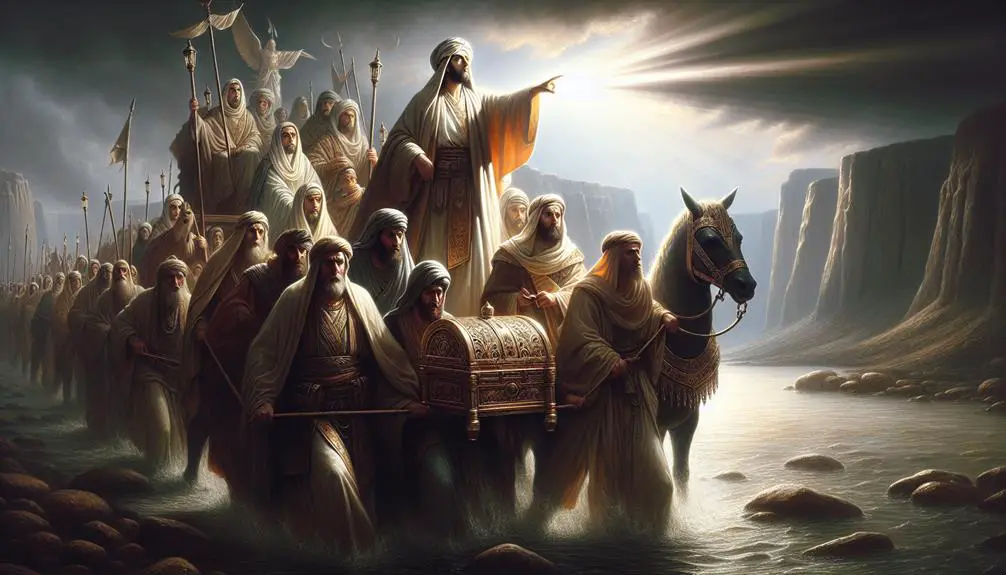
In the biblical narrative, the crossing of the Jordan River marks a pivotal moment for the Israelites under Joshua's leadership, symbolizing their entry into the Promised Land. This event carries deep theological and symbolic significance, especially when considering the elements of Jordan purification and the Ark's presence.
The Jordan River, often seen as a natural barrier, becomes a site of miraculous passage, underscoring themes of purification and preparation as the Israelites transition from their wilderness wanderings to claiming their inheritance. The waters of Jordan, halting as the priests bearing the Ark of the Covenant step into its flow, signify not only a physical but also a spiritual cleansing, preparing the people for their new life in the land divinely promised to them.
The presence of the Ark during this crossing underlines God's continuous guidance and assurance to Joshua and the Israelites. It serves as a tangible sign of God's covenant and His promises, reinforcing the idea that their conquest isn't by might nor by power but by the spirit and will of God. This moment, then, isn't just a historical or military milestone but a profound act of faith and obedience, encapsulating the essence of the journey from bondage to freedom, from exile to homecoming.
The Fall of Jericho
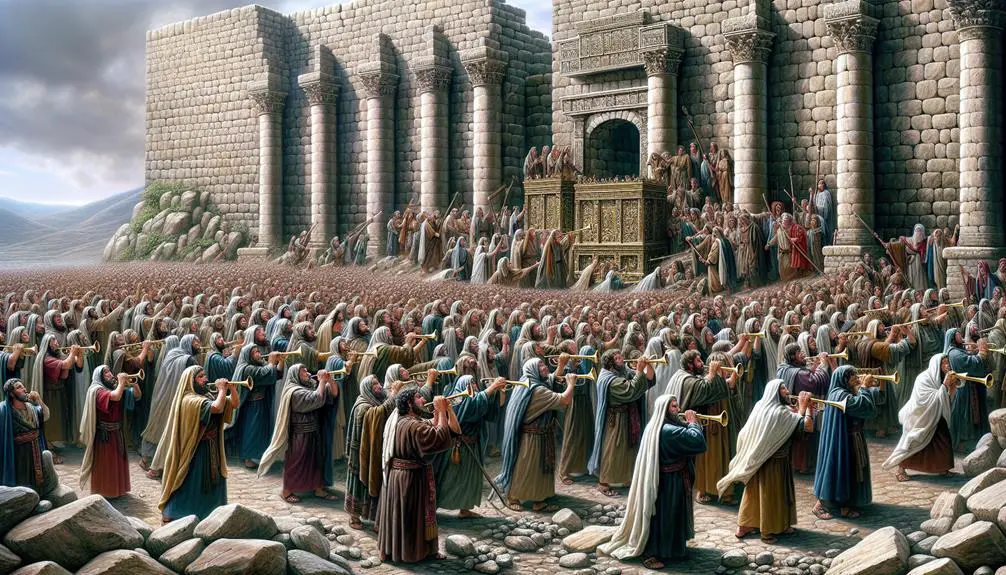
As you turn your attention to the Fall of Jericho, consider the pivotal moment when Jericho's walls collapsed, a key event that underscored the Israelites' conquest strategy under Joshua's leadership.
This incident not only reflects on Joshua's military acumen but also highlights the intersection of faith and warfare in ancient Israelite society.
Analyzing Joshua's battle strategy offers insights into the broader theological and historical implications of this event within the biblical narrative.
Jericho's Walls Collapse
Upon entering Canaan, Joshua's strategic actions led to the dramatic collapse of Jericho's walls, marking a pivotal moment in biblical history. This event is supported by archaeological evidence and showcases unique military tactics.
- Archaeological Evidence: Excavations reveal layers of destruction, hinting at a significant event.
- Military Tactics: The strategy diverged from conventional siege methods, indicating innovative approaches.
- Psychological Impact: The fall had profound effects on both Israelites and their adversaries.
- Divine Intervention: Texts attribute the success to supernatural assistance, highlighting faith's role.
- Historical Significance: This victory set the stage for further conquests, reshaping the region's geopolitical landscape.
Analyzing these elements offers insights into the complexity of ancient warfare and the intertwining of faith and military strategy in biblical narratives.
Joshua's Battle Strategy
Delving deeper into Joshua's military strategies reveals how unconventional tactics and divine guidance coalesced to bring about the fall of Jericho. His leadership qualities were paramount, employing tactical retreats not as signs of weakness but as strategic maneuvers to confuse and outwit his adversaries.
Aspect |
Description |
Impact |
|---|---|---|
Leadership |
Joshua's ability to inspire and command |
Ensured unity and compliance |
Divine Guidance |
Following a higher command beyond conventional warfare tactics |
Gave an unconventional edge |
Tactical Retreats |
Used not just to regroup but also as a deceptive tactic |
Sowed confusion among enemies |
Unconventional Tactics |
Marching around Jericho, the use of trumpets |
Psychological warfare leading to victory |
Analyzing these strategies highlights the blend of faith, foresight, and military acumen that defined Joshua's approach to the siege of Jericho.
Commander and Divine Encounters
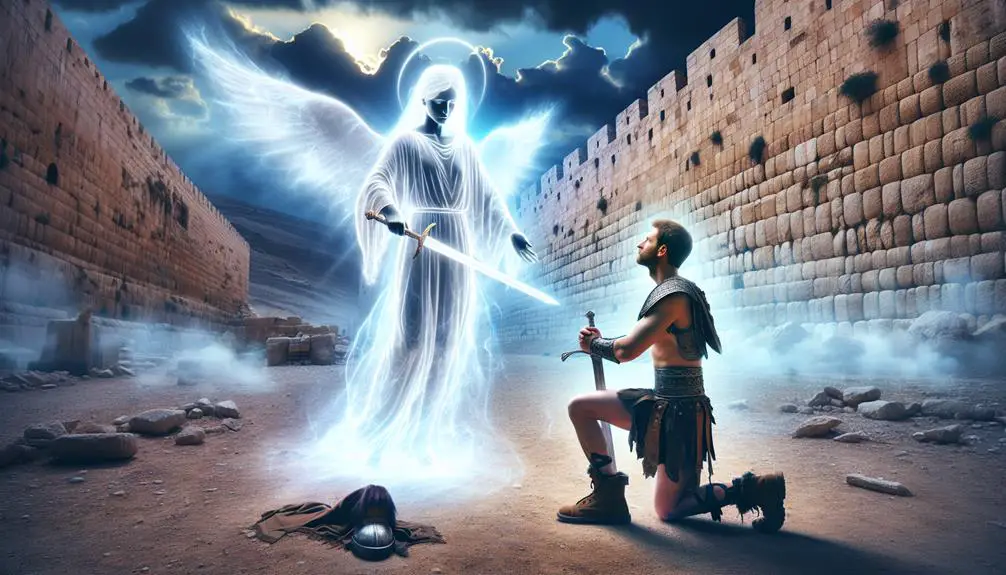
Joshua's role as a commander intertwines significantly with his divine encounters, showcasing a unique leadership style shaped by supernatural guidance. His leadership qualities aren't just rooted in military prowess but are deeply intertwined with his spiritual encounters, which guide his decisions and actions. These encounters not only provide him with strategic insight but also serve as a means for covenant renewal, ensuring that his leadership aligns with divine will.
To understand this dynamic, consider the following aspects:
- Leadership qualities: Joshua's ability to lead is amplified by his direct communication with the divine, setting a precedent for decision-making that relies on spiritual insight.
- Covenant renewal: Divine encounters often serve to reaffirm the covenant between God and Israel, positioning Joshua as a mediator who ensures the people's adherence to their commitments.
- Strategic guidance: Joshua receives specific instructions from the divine, which inform his military strategies and ensure their success.
- Moral fortitude: These encounters reinforce Joshua's moral resolve, ensuring that his leadership isn't just effective but also ethically grounded.
- Community impact: The effects of Joshua's divine encounters extend beyond the battlefield, influencing the spiritual and social fabric of the Israelite community.
Through these elements, Joshua's leadership exemplifies how divine encounters can shape a commander's approach, blending spiritual guidance with military strategy.
The Sun Stands Still
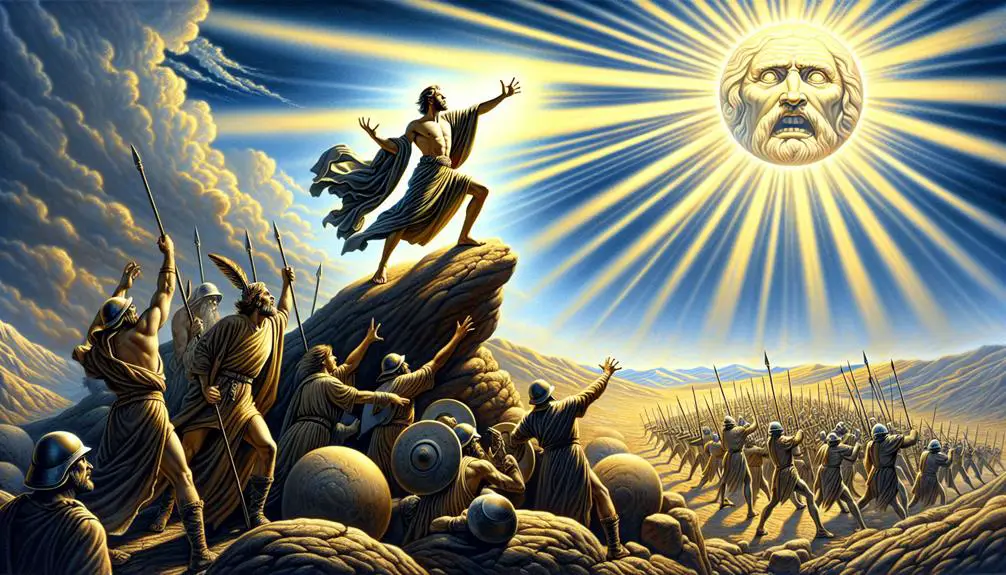
One of the most extraordinary biblical narratives involving Joshua's leadership is when he commands the sun to stand still. This event, recorded in the book of Joshua, has sparked considerable debate regarding its historical accuracy and the search for possible astronomical explanations. Scholars delve into this narrative with a lens that scrutinizes ancient texts and astronomical records, attempting to reconcile the miraculous with the plausible.
The quest for understanding doesn't diminish the narrative's significance within the biblical context. Instead, it highlights the intersection between faith, history, and science. You'll find that interpretations vary widely. Some propose the event as metaphorical, a literary device to emphasize the importance of the moment. Others suggest natural phenomena that could explain the prolonged daylight, grounding the miracle in observable events.
The discussion around this event isn't just an academic exercise; it's a reflection of the broader endeavor to understand how the divine intersects with the natural world. As you explore the various theories, remember that the narrative's power lies not only in its historical accuracy but in its ability to inspire faith, wonder, and debate across generations.
Distributing the Promised Land
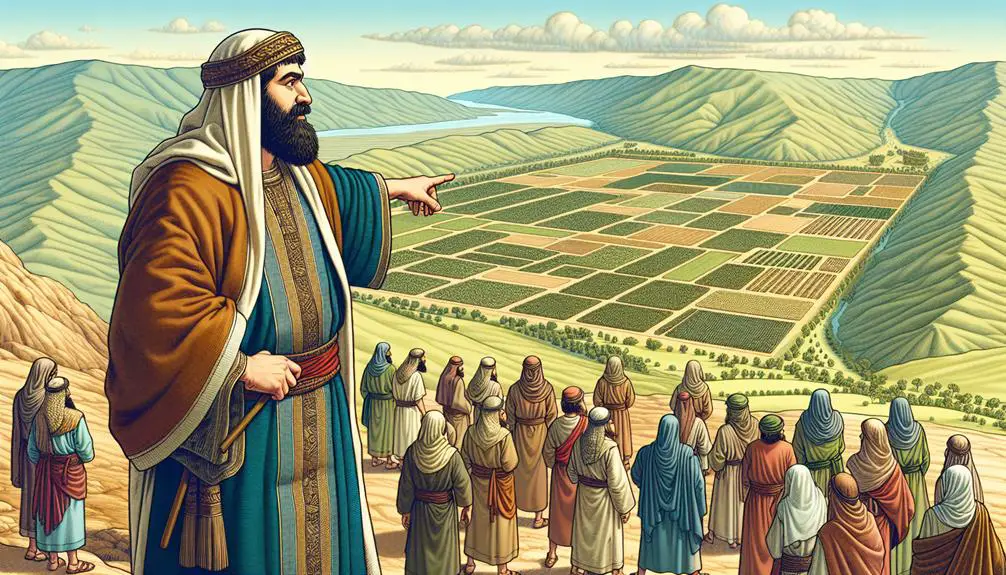
After securing victory in Canaan, Joshua undertook the complex task of distributing the Promised Land among the Israelite tribes, a process that wasn't only pivotal for their settlement but also laden with significant socio-political implications.
- Tribal Allotments: Joshua's distribution was meticulously planned, with each of the twelve tribes receiving a portion of the land, ensuring a fair and equitable division that respected their historical and familial ties.
- Covenant Renewal: The allocation process was deeply intertwined with the renewal of the covenant between God and the Israelites, reinforcing their commitment to follow God's laws in exchange for His protection and blessings.
- Strategic Considerations: The distribution took into account strategic military and economic considerations, ensuring that each tribe could sustain itself and contribute to the collective security and prosperity of the nation.
- Resolution of Disputes: Joshua's role as a mediator in resolving disputes over land allocations was crucial in maintaining unity among the tribes, highlighting his leadership and wisdom.
- Preparation for Future Generations: The thoughtful distribution of the land laid the foundation for the future development and stability of the Israelite nation, ensuring that each tribe had the resources needed to thrive.
This meticulous process underscored the importance of leadership, divine guidance, and communal harmony in the successful establishment of the Israelites in their new homeland.
Joshua's Farewell Address
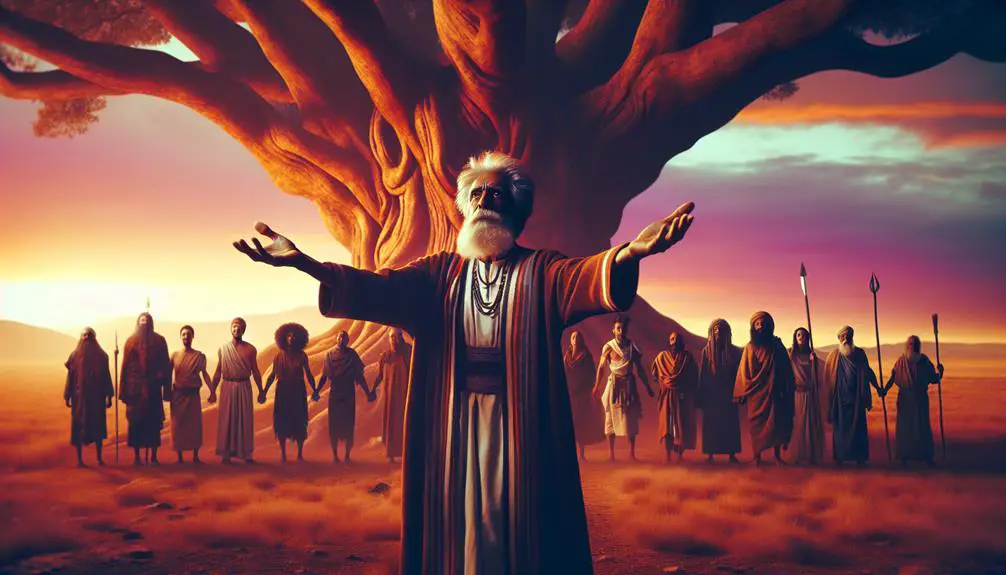
Having meticulously distributed the Promised Land among the Israelite tribes, Joshua then turned to address the people, offering final words that would guide them in maintaining their covenant with God. This moment, crystallized in the biblical narrative, showcases Joshua's profound leadership qualities and his vision for sustaining tribal unity. His farewell address isn't merely a goodbye; it's a strategic blueprint for the future, emphasizing the importance of adherence to God's laws and the collective responsibility of the tribes to uphold their shared values and beliefs.
Joshua's discourse reflects an acute awareness of the challenges that lie ahead for the Israelites, including the temptations to stray from their faith and the potential for internal discord. By invoking their shared history and the covenant with God, he seeks to fortify a sense of communal identity and purpose. His emphasis on tribal unity as a cornerstone of their continued success underlines the critical role of solidarity in navigating the trials of nationhood.
Moreover, Joshua's address encapsulates the essence of his leadership qualities—foresight, wisdom, and a deep commitment to the welfare of his people. These traits not only solidified his legacy but also set a precedent for future generations to emulate, underscoring the timeless relevance of his teachings.
Frequently Asked Questions
How Do Modern Archaeological Findings Correlate With the Biblical Account of Joshua's Conquests?
Modern archaeological findings, particularly in Jericho archaeology, offer mixed support for the biblical account of Joshua's conquests. While some evidence aligns with the strategic battle tactics described, discrepancies in timelines and the extent of destruction challenge a direct correlation.
Scholars analyze these findings objectively, considering the archaeological context alongside historical and biblical narratives. This analytical approach helps to understand the complexities of correlating ancient texts with physical evidence.
What Are the Ethical Implications and Debates Surrounding Joshua's Military Campaigns in the Context of Contemporary Values?
You're diving into the ethical implications and debates of historical military campaigns, analyzing them through the lens of contemporary values.
It's crucial to consider moral relativism and the historical context to understand these actions objectively.
By doing so, you'll navigate the complexities of judging past events by today's standards, ensuring a scholarly and analytical approach.
This method helps in dissecting the varied perspectives on what's often a contentious topic.
How Has the Character of Joshua Been Portrayed and Interpreted in Different Religious Traditions Outside of Judaism and Christianity?
You're diving into how Joshua's legacy stretches beyond familiar narratives, venturing into Islamic perspectives and Bahá'í interpretations.
Islamic texts honor him as a noble prophet, highlighting his unwavering faith and leadership. Meanwhile, the Bahá'í faith regards Joshua with admiration, viewing his conquests as spiritual victories.
This analytical journey reveals the multifaceted character of Joshua, showcasing how different traditions have reshaped his story, enriching our understanding of his enduring influence.
Can Joshua's Leadership Style Be Compared to Modern Leadership Theories and Practices?
Yes, Joshua's leadership style can be compared to modern leadership theories and practices. His leadership traits, including decisiveness and strategic thinking, align with contemporary models like transformational leadership.
Joshua's decision-making process, marked by consultation and adaptability, mirrors modern collaborative approaches.
Analyzing his methods provides insights into effective leadership, demonstrating how ancient strategies can inform current practices.
This comparison encourages a deeper understanding of leadership's timeless aspects.
How Do Scholars Reconcile the Miraculous Events Associated With Joshua (Such as the Sun Standing Still) With Historical and Scientific Analyses?
Navigating the waters between miraculous interpretations and scientific skepticism, scholars often embark on a delicate balancing act. They typically employ a metaphorical lens, viewing these narratives as rich in symbolic meaning rather than literal historical accounts.
This approach allows them to reconcile the extraordinary with the plausible, integrating faith-based perspectives with empirical evidence. Through critical analysis and comparative studies, they seek to understand the essence of these events within their historical and cultural context.
Conclusion
In sum, you've journeyed through Joshua's epic saga, where faith and leadership interweave to conquer lands and hearts alike.
Like a skilled painter, Joshua colors the canvas of Israel's history with bold strokes of courage and divine guidance.
His tale isn't just an ancient echo; it's a masterclass in navigating life's battles with unwavering faith.
As the sun stood still for Joshua, may his story illuminate your path, proving that with belief, even the impossible becomes possible.

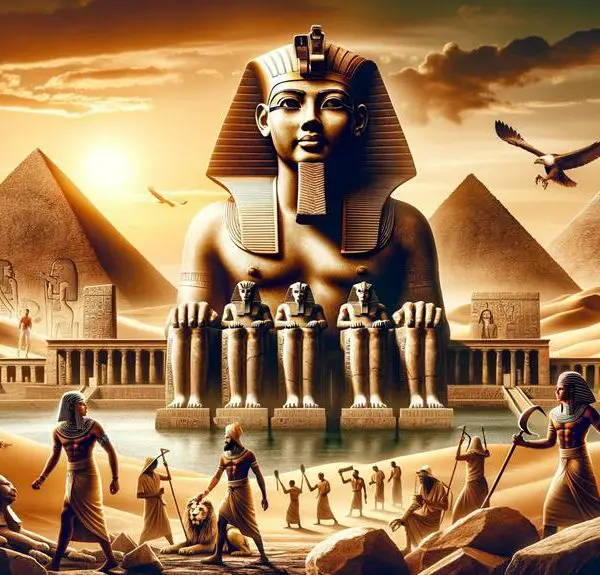

Sign up